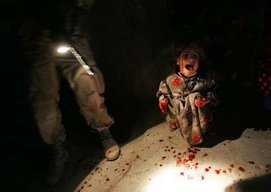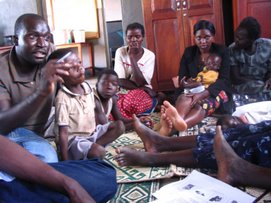Uganda's fugitive guerrilla Joseph Kony will meet mediators on Saturday on the Sudan-Congo border and may even sign a final peace deal, a rebel negotiator said on Wednesday.
But the leader of the Lord's Resistance Army (LRA) still wants more details on how Uganda's government plans to use traditional reconciliation rituals to help him avoid prosecution for war crimes by the International Criminal Court.
Talks to end Kony's 22-year insurgency looked to have collapsed last month when the LRA commander sacked his chief negotiator and then failed to appear at a signing ceremony in a forest clearing on the remote frontier.
Kony's new negotiator, James Obita, told Reuters that the elusive rebel boss would turn up this time.
"On May 10 Kony is ready to meet leaders from northern Uganda, the mediator (south Sudan's Vice President Riek Machar) and probably sign the final peace agreement," he said.
"But he requests that we hold a workshop to clarify the relationship between the traditional justice systems and the ICC."
Uganda's civil war has killed tens of thousands of people, uprooted 2 million more and destabilised neighbouring parts of oil-producing southern Sudan and mineral-rich eastern Congo.
This year, LRA fighters have also attacked villages and killed civilians in Central African Republic, aid workers say.
Obita was among LRA representatives visiting the Ugandan capital Kampala for talks with religious and traditional leaders on how to save nearly two years of negotiations.
At the centre of their discussions is a government offer to call for the scrapping of ICC indictments naming LRA leaders if Kony signs a final peace deal. Ancient northern Uganda reconciliation rituals would be used instead, it says.
Kony and two of his top deputies are wanted for war crimes including rape, murder and the kidnapping of thousands of children to serve as fighters, porters and sex slaves.
One of those deputies, Okot Odhiambo, was said to have been killed in fierce inter-LRA fighting last month.
The Hague-based ICC says its warrants remain active, and that Uganda is legally obliged to hand over its targets.
On Wednesday, a group of 40 non-governmental organisations urged all parties in the conflict not to give up on talks.
"A failure to secure the peace and resort to a `military solution' would trigger renewed fears of insecurity and threaten the considerable progress made on the ground in northern Uganda," it said.
Wednesday, May 7, 2008
Subscribe to:
Post Comments (Atom)












No comments:
Post a Comment